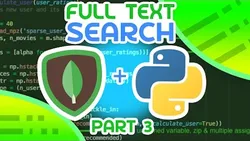
MongoDB + Python #3 - Full-Text Search with Atlas Search 
This course provides an overview of Full-Text Search with MongoDB Atlas Search, including sample data walkthroughs, search indexes, fuzzy matching, synonym matching, autocomplete, compound queries, and relevancy search. It covers the fundamentals of setting up and using MongoDB Atlas Search to enable powerful search capabilities for applications. ▼
ADVERTISEMENT
Course Feature
![]() Cost:
Cost:
Free
![]() Provider:
Provider:
Youtube
![]() Certificate:
Certificate:
Paid Certification
![]() Language:
Language:
English
![]() Start Date:
Start Date:
On-Demand
Course Overview
❗The content presented here is sourced directly from Youtube platform. For comprehensive course details, including enrollment information, simply click on the 'Go to class' link on our website.
Updated in [February 21st, 2023]
| Overview
| What is Full-Text Search?
| Sample Data Walkthrough
| Search Indexes
| Fuzzy Matching
| Synonym Matching
| Autocomplete
| Compound Queries
| Relevancy Search
(Please note that we obtained the following content based on information that users may want to know, such as skills, applicable scenarios, future development, etc., combined with AI tools, and have been manually reviewed)
MongoDB + Python #3 - Full-Text Search with Atlas Search is a course designed to help learners understand and use full-text search capabilities in MongoDB Atlas. This course will cover the basics of full-text search, including sample data walkthroughs, search indexes, fuzzy matching, synonym matching, autocomplete, compound queries, and relevancy search. Learners will gain an understanding of how to use full-text search to quickly and accurately find the data they need. Additionally, learners will learn how to optimize their search queries for better performance and accuracy. By the end of the course, learners will have the skills and knowledge to effectively use full-text search in MongoDB Atlas.
[Applications]
After completing this course, users should be able to apply the concepts of full-text search with Atlas Search to their MongoDB + Python applications. They should be able to create search indexes, use fuzzy matching, synonym matching, autocomplete, compound queries, and relevancy search. Additionally, users should be able to use the sample data walkthrough to understand how to apply the concepts to their own applications.
[Career Paths]
1. Data Scientist: Data Scientists use MongoDB and Python to analyze large datasets and uncover insights. They use advanced analytics techniques such as machine learning, natural language processing, and predictive analytics to develop models and algorithms that can be used to make decisions. They also use MongoDB and Python to develop data-driven applications and services. The demand for Data Scientists is growing rapidly as organizations look to leverage data to gain a competitive edge.
2. Database Administrator: Database Administrators are responsible for managing and maintaining MongoDB databases. They are responsible for ensuring the security, performance, and availability of the database. They also develop and maintain database schemas, optimize queries, and troubleshoot any issues that arise. As MongoDB continues to grow in popularity, the demand for Database Administrators is expected to increase.
3. Software Developer: Software Developers use MongoDB and Python to develop web applications and services. They use MongoDB to store and query data, and Python to create the logic and user interface for the application. They also use MongoDB and Python to develop APIs and integrate with other systems. As organizations continue to move towards digital transformation, the demand for Software Developers is expected to increase.
4. DevOps Engineer: DevOps Engineers use MongoDB and Python to automate the deployment and management of applications and services. They use MongoDB and Python to create scripts and tools that can be used to automate tasks such as provisioning, configuration, and deployment. As organizations look to increase their agility and reduce costs, the demand for DevOps Engineers is expected to increase.
[Education Paths]
1. Computer Science Degree: Computer Science degrees provide students with the knowledge and skills to develop, design, and analyze computer systems. This degree is ideal for those interested in working with MongoDB and Python, as it covers topics such as software engineering, database design, and programming languages. Additionally, this degree is becoming increasingly popular as the demand for skilled software engineers continues to grow.
2. Data Science Degree: Data Science degrees provide students with the skills to analyze and interpret data. This degree is ideal for those interested in working with MongoDB and Python, as it covers topics such as data mining, machine learning, and data visualization. Additionally, this degree is becoming increasingly popular as the demand for data scientists continues to grow.
3. Information Technology Degree: Information Technology degrees provide students with the knowledge and skills to design, develop, and manage computer systems. This degree is ideal for those interested in working with MongoDB and Python, as it covers topics such as network security, database management, and software development. Additionally, this degree is becoming increasingly popular as the demand for IT professionals continues to grow.
4. Business Analytics Degree: Business Analytics degrees provide students with the skills to analyze and interpret data to make informed business decisions. This degree is ideal for those interested in working with MongoDB and Python, as it covers topics such as data analysis, predictive analytics, and business intelligence. Additionally, this degree is becoming increasingly popular as the demand for business analysts continues to grow.
Course Provider

Provider Youtube's Stats at AZClass
Discussion and Reviews
0.0 (Based on 0 reviews)
Explore Similar Online Courses

COVID-19 Coronavirus: Epidemiology Pathophysiology APRIL UPDATE

Unreal Engine & C++ Tutorial - Endless Runner Game ️

Python for Informatics: Exploring Information

Social Network Analysis

Introduction to Systematic Review and Meta-Analysis

The Analytics Edge

DCO042 - Python For Informatics

Causal Diagrams: Draw Your Assumptions Before Your Conclusions

Whole genome sequencing of bacterial genomes - tools and applications

Searching for Text in MongoDB

Learning MongoDB - NoSQL database


Start your review of MongoDB + Python #3 - Full-Text Search with Atlas Search